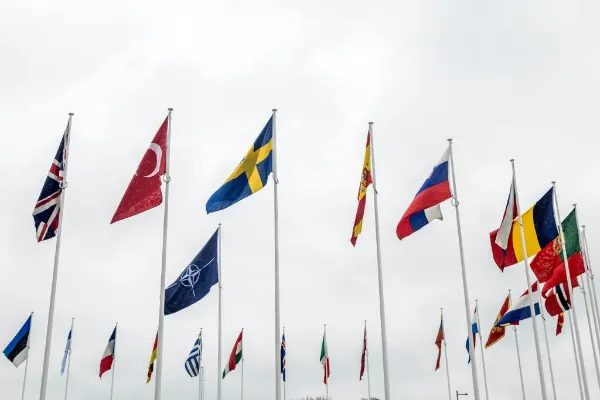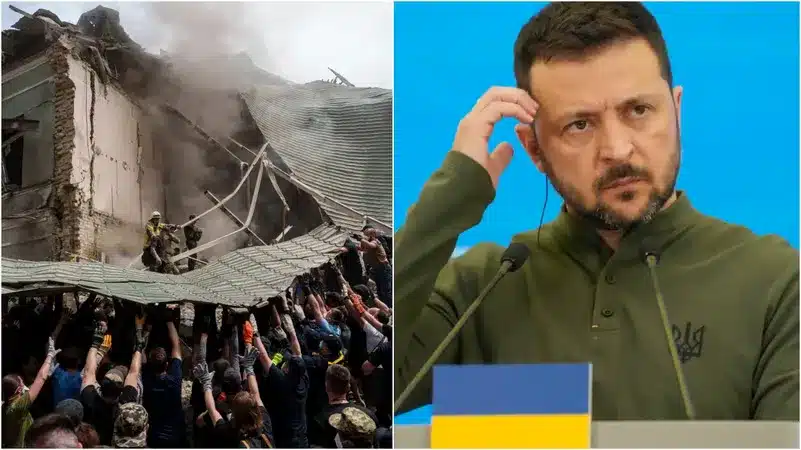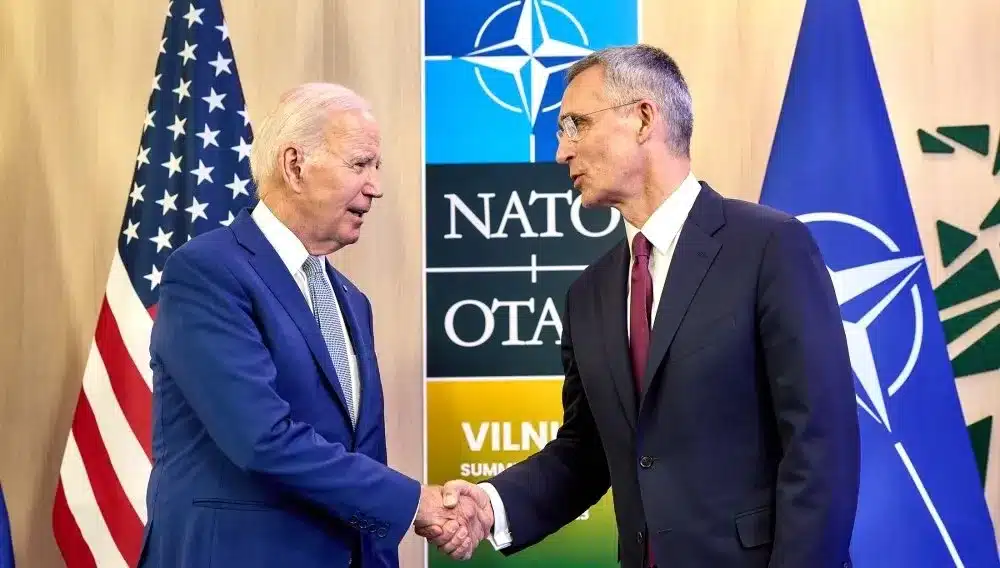
That was back then, and this is now. The world today is very different from what it was 75 years ago. Its political and economic landscape has profoundly changed, with new economic and political powers arising in the global East and South. The changes bring new challenges and problems that require new approaches, strategies, and ideas. But even more importantly, today we view the world in vastly different and diverse ways. We have become more sensitive to differences and more appreciative of the diversity that the world has to offer. An expectation that the world can conform to one “true” perspective, no matter how successful it has been in the past, looks very odd and obsolete in the contemporary world.
Media reports note that one important reason for convening the summit is to convey confidence in the newly expanded alliance and to demonstrate to the world the unity and resolve of the member states to lead the world to a better future. However, as important as these symbolic gestures may be, there is another and far more important task that the alliance faces. The chaos that reigns in the world today poses a serious existential threat. We certainly cannot bring back the order that existed in the world since WWII. The world needs a new order. It needs a revised architecture of the global security system that can maintain peace and stability in the future. This task is far more important than political symbolism and confidence-building measures. What are NATO’s plans about the new world order?
On the eve of the summit, Foreign Affairs magazine published an article by the outgoing secretary general of the alliance Jens Stoltenberg. Amidst obligatory tributes and accolades on NATO’s successes and criticisms of rivals (mostly China and Russia), the article “What NATO Means to the World” provides in broad strokes the outlines of what may very well be the alliance’s agenda for the future.
Stoltenberg may have had an intention to project confidence and offer reassurances to world, but a close reading of his piece raises serious concerns, doubts, and apprehensions. The most important part of the vision that emerges from his preview is that NATO’s security concerns will no longer be about the defense of the transatlantic community or Europe.
A renewed and stronger NATO will be vastly expanding its role well beyond Europe. Support for Ukraine is part of this plan. Stoltenberg speaks for the entire alliance when he writes: “We will work hand in hand with our partners in the Indo-Pacific on shared security concerns.” NATO is preparing to respond to new global challenges and for the long term. For this reason, the alliance will continue to urge its members to increase their military budgets even above the required 2% of GDP. This year European allies and Canada have increased their military spending by 18%–the highest increase since the end of the Cold War.
The more one reads the preview of what to expect, the more one realizes that this is not about defense. It is about a new world order where NATO under U.S. hegemony is going to be a dominant power that will enforce its global order.
This hegemonic approach is in stark contrast to the strategic vision articulated by China and Russia. These two countries and their allies see the new world order in terms of polycentrism and regional security arrangements. Although China and Russia are probably the most vocal proponents of such approach, other nations of the world—India, Iran, North Korea among them—support it.
Stoltenberg reserves very strong words that look more like a veiled threat directed at China and its leadership. The alliance, he writes, is fully prepared for “enduring competition with China,” and not just in the Pacific or over Taiwan. Stoltenberg specifically accuses President Xi of being double-faced on the war in Ukraine. While the Chinese leader, Stoltenberg alleges, hypocritically tries to convince the world “that he is pushing for peace” in Ukraine, in reality “he is fueling the conflict” by secretly supporting Russia and providing it with high-end technologies, including semiconductors and microelectronics that the Kremlin uses in producing missiles, tanks, and aircraft. Stoltenberg warns President Xi that he cannot have it both ways and at some point, China’s support for Russia “will incur an inevitable cost.”
Readers will find little ground for optimism in Stoltenberg’s piece. NATO, he assures us, will continue to increase its strength and expand its global hegemony—all in the name of liberalism and its gospel. It will enforce the order that will embody Western liberal rules, norms, and values.
The message seems to be coming from a very distant past with little relevance to today’s world. Its self-righteousness certainty that the only way for the world to go is to comply with the liberal vision. NATO will be the enforcer of the rules and norms of international behavior that it formulates.
There is no reason for other nations to acquiesce in this vision. Liberalism does not represent a universal view of reality. In fact, liberal theory and practice are exclusionary, subjective, and arbitrary. There is much evidence that proves this point. History shows that liberalism is responsible for many conflicts and wars; it has sustained inequality, exploitation, colonialism, and much else.
Liberals argue that all these forms of oppression associated with liberalism are in the past or on the way out; that they now know better. This argument does not pass the test of rational justification or empirical verification. The fact is that liberals have not solved and cannot solve the problem of difference. Liberal theory and practice are exclusionary, subjective, and arbitrary. They are not universal and, for this reason, cannot and will not be acceptable to any country that has a different view. Liberals cannot solve the problem of difference in their own countries. Just ask 75 million Americans who feel unhappy and excluded by their own government and who have voted for Donald Trump. Liberals may label them as “deplorables” but that does not change facts.
If liberals cannot solve the problem of difference in their own countries, why should China or Russia that have their own traditions, their own historical experience from which they have learned a great deal, that have their own norms and values accept the “truth” fabricated by the West? China’s experience with colonialism that ravaged their country was very traumatic. Chinese people would never agree to go again through this experience.
Stoltenberg’s preview of what NATO intends to pursue in the future is not optimistic. The readers learn that NATO will continue to increase its military force to establish its domination over the world. Its current leadership is determined to spread the gospel of liberalism. NATO will enforce its own norms, values, and rules of international behavior with which other countries will have to comply.
The only assurance that readers get from Stoltenberg’s piece is that no matter where they live, they should brace themselves for a long period of conflicts and wars with unpredictable consequences for the entire world. NATO members will bear a lion’s share of responsibility for the continued global unrest. The narrative their leaders have constructed is that NATO will fight against authoritarianism. It is patently false. NATO will fight against “bad” authoritarianism, not against the one they consider “good.” The paradoxes and contradictions of this vision do not portend well for world nations. This vision promises disorder, not order. Under the current leadership, NATO will continue to act irresponsibly and with brazen disregard for common sense in the future, only much more so than in the past.
~~~
Gennady Shkliarevsky is Professor Emeritus of History at Bard College.






NATO, .like the UN, is another One World construct to dupe people into thinking that ONE government, ONE financial system, ONE military is the key to world peace. Never fall for Globalist BS
The corrupt alliance wants more money and power.
Stoltenberg the parrot says a different thing each week. He is chief cheerleader. He expects China to break all ties with Russia? How dare China continue trading with Russia!
A one world satanic government setting the stage for the anti-Christ.
Hopefully Trump reads GS article.
And to think, we’re funding this madness.
We do.
Trump was the ONLY POTUS ever, to question it and ask for others to pay their fair share.